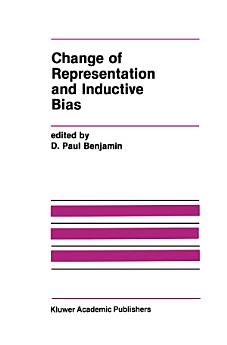Change of Representation and Inductive Bias
D. Paul Benjamin
Dis 2012 · The Springer International Series in Engineering and Computer Science Ibhuku elingu-87 · Springer Science & Business Media
4.0star
2 izibuyekezoreport
I-Ebook
356
Amakhasi
reportIzilinganiso nezibuyekezo aziqinisekisiwe Funda Kabanzi
Mayelana nale ebook
Change of Representation and Inductive Bias One of the most important emerging concerns of machine learning researchers is the dependence of their learning programs on the underlying representations, especially on the languages used to describe hypotheses. The effectiveness of learning algorithms is very sensitive to this choice of language; choosing too large a language permits too many possible hypotheses for a program to consider, precluding effective learning, but choosing too small a language can prohibit a program from being able to find acceptable hypotheses. This dependence is not just a pitfall, however; it is also an opportunity. The work of Saul Amarel over the past two decades has demonstrated the effectiveness of representational shift as a problem-solving technique. An increasing number of machine learning researchers are building programs that learn to alter their language to improve their effectiveness. At the Fourth Machine Learning Workshop held in June, 1987, at the University of California at Irvine, it became clear that the both the machine learning community and the number of topics it addresses had grown so large that the representation issue could not be discussed in sufficient depth. A number of attendees were particularly interested in the related topics of constructive induction, problem reformulation, representation selection, and multiple levels of abstraction. Rob Holte, Larry Rendell, and I decided to hold a workshop in 1988 to discuss these topics. To keep this workshop small, we decided that participation be by invitation only.
Izilinganiso nezibuyekezo
4.0
2 izibuyekezo
Nikeza le ebook isilinganiso
Sitshele ukuthi ucabangani.
Ulwazi lokufunda
Amasmathifoni namathebulethi
Faka uhlelo lokusebenza lwe-Google Play Amabhuku lwe-Android ne-iPad/iPhone. Livunyelaniswa ngokuzenzakalela ne-akhawunti yakho liphinde likuvumele ukuthi ufunde uxhunywe ku-inthanethi noma ungaxhunyiwe noma ngabe ukuphi.
Amakhompyutha aphathekayo namakhompyutha
Ungalalela ama-audiobook athengwe ku-Google Play usebenzisa isiphequluli sewebhu sekhompuyutha yakho.
Ama-eReaders namanye amadivayisi
Ukuze ufunde kumadivayisi e-e-ink afana ne-Kobo eReaders, uzodinga ukudawuniloda ifayela futhi ulidlulisele kudivayisi yakho. Landela imiyalelo Yesikhungo Sosizo eningiliziwe ukuze udlulise amafayela kuma-eReader asekelwayo.








